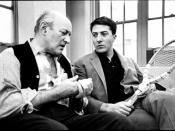Born on October 17, 1915 in New York to an Austrian clothing manufacturer and shopkeeper, Arthur Miller's childhood life influenced his writing of Death of a Salesman, which opened in 1949. His father, Isidore Miller was ruined by the coming of the Depression. Consequently, the family moved to a small house in Brooklyn, which was the model for the house in Death of a Salesman.
Miller's childhood life became the basis for the play, which incorporated tragic characters attempting to sort between their obligations and their desires. Biff is one such character whose love and loyalty to his father, Willy Loman, was enormous He wanted, however, to seek the truth about himself as he found out that his father's morals were shallow and illusions were false. Eventually, as he confronted his reality, Biff was able to free himself from his father's shadow. Apparently, Biff can be seen as a tragic hero fighting internally between two gripping thoughts.
Biff's devotion to his father came from the many events that happened in his life. From Willy ,for example, Biff learned how to achieve apparent success. His father many times said, "...The man who makes an appearance in the business world, the man who creates personal interest, is the man who gets ahead. Be liked and you will never want" (pg 21). He regarded Biff's friend, Bernard, as a failure because he was not well-liked among the other students. Furthermore, His father undoubtedly supported him through high school and college. Willy knew that his son's reputation as a great football player would not easily fade away from the minds of his peers. Similarly, Biff truly believed in his father. He was confident that his father would be able to convince his Math professor to give him the points his needed to...


